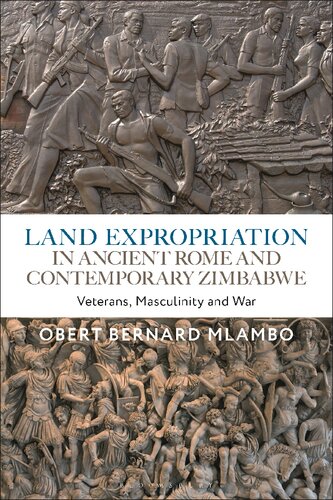Product desciption
Land Expropriation In Ancient Rome And Contemporary Zimbabwe Veterans Masculinity And War Obert Bernard Mlambo by Obert Bernard Mlambo 9781350291850, 9781350291881, 1350291854, 1350291889 instant download after payment.
In this highly original book, Obert Bernard Mlambo offers a comparative and critical examination of the relationship between military veterans and land expropriation in the client-army of the first-century BC Roman Republic and veterans of the Zimbabwean liberation war. The study centres on the body of the soldier, the cultural production of images and representations of gender which advance theoretical discussions around war, masculinity and violence. Mlambo employs a transcultural comparative approach based on a persistent factor found in both societies: land expropriation. Often articulated in a framework of patriarchy, land appropriation takes place in the context of war-shaped masculinities.
This book fosters a deeper understanding of social processes, adding an important new perspective to the study of military violence, and paying attention to veterans’ claims for rewards and compensation. These claims are developed in the context of war and its direct consequences, namely expropriation, confiscation and violence. Land Expropriation in Ancient Rome and Contemporary Zimbabwe contributes to current efforts to decolonise knowledge construction by revealing that a non-Western perspective can broaden our understanding of veterans, war, violence, land and gender in classical culture.
This book, situated in the field of Roman history, poses new questions in the area of Roman historical inquiry, while attending to other fields such as History, Anthropology, Classics, African Classical Reception, Black Classicism and Comparative History. Such questions involve parallels with an African context, and are linked to modern concepts—masculinity, gender, identity and embodied practice. The book argues that a non-Western cultural perspective can broaden the understanding of Classics generally, and in particular can illuminate the discussion of veterans, war, masculinity, violence, land and gender in a Classical culture. It explores issues involving military veterans and land expropriation, particularly in the two cases of the client-army era of the first-century BC Roman Republic and contemporary Zimbabwe. It centralizes culture, the physical body of a soldier and the cultural production of images and representations of masculinity, to advance theoretical thought on war, masculinity and violence. Analysis of these cases serves to identify the cultural logic that connects masculinity, violence and expropriation beyond the particulars of each case, offering an approach to Classics informed by African culture. The book’s transcultural-comparative thrust is based on one constant found in both societies, namely land expropriation. Such appropriation takes place in the context of war-ingrained masculinities, often articulated within the overarching framework of patriarchy. In discussing the issue of claims for rewards or compensation for veterans in the context of war, and their consequences—expropriation, confiscations, violence, etc. – the book fosters a deeper understanding of these social processes, relating the study of masculinity to the consideration of the soldier’s body, and military violence.


